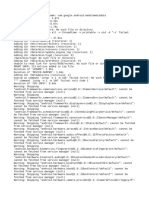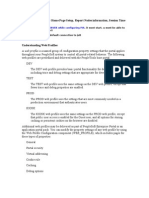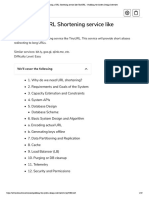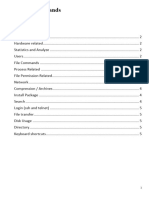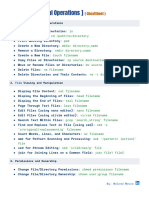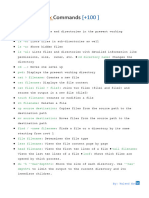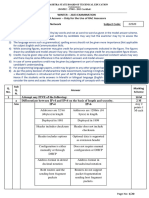0 ratings0% found this document useful (0 votes)
2 views3 pagesLinux_Commands_Cheat_Sheet
This document is a cheat sheet for Linux commands, covering various categories such as file and directory management, file permissions, process monitoring, user management, networking, package management, searching, text processing, archiving, and system control. Each command is accompanied by a brief description of its function. It serves as a quick reference for users to efficiently navigate and manage Linux systems.
Uploaded by
BASaiTejaCopyright
© © All Rights Reserved
We take content rights seriously. If you suspect this is your content, claim it here.
Available Formats
Download as DOCX, PDF, TXT or read online on Scribd
0 ratings0% found this document useful (0 votes)
2 views3 pagesLinux_Commands_Cheat_Sheet
This document is a cheat sheet for Linux commands, covering various categories such as file and directory management, file permissions, process monitoring, user management, networking, package management, searching, text processing, archiving, and system control. Each command is accompanied by a brief description of its function. It serves as a quick reference for users to efficiently navigate and manage Linux systems.
Uploaded by
BASaiTejaCopyright
© © All Rights Reserved
We take content rights seriously. If you suspect this is your content, claim it here.
Available Formats
Download as DOCX, PDF, TXT or read online on Scribd
You are on page 1/ 3
Linux Commands Cheat Sheet
1. File & Directory Management
`ls` → List files in a directory.
`pwd` → Show current directory path.
`cd /path/to/directory` → Change directory.
`mkdir directory_name` → Create a new directory.
`rm file_name` → Delete a file.
`rm -r directory_name` → Delete a directory and its contents.
`cp source destination` → Copy a file.
`cp -r source destination` → Copy a directory.
`mv old_name new_name` → Rename/move a file or directory.
2. File Permissions & Ownership
`chmod 755 file_name` → Change file permissions.
`chown user:group file_name` → Change file ownership.
`ls -l` → View file permissions.
3. Process & System Monitoring
`ps aux` → Show running processes.
`top` or `htop` → Display system resource usage.
`kill PID` → Kill a process by ID.
`df -h` → Show disk space usage.
`du -sh /path/to/directory` → Show directory size.
`free -m` → Show memory usage.
4. User Management
`whoami` → Show current user.
`who` → Show logged-in users.
`adduser username` → Create a new user.
`passwd username` → Change user password.
`usermod -aG group_name username` → Add a user to a group.
5. Networking Commands
`ip a` or `ifconfig` → Show network interfaces.
`ping google.com` → Check network connectivity.
`netstat -tulnp` → Show open ports.
`scp file user@remote:/path` → Secure copy a file to another server.
`ssh user@remote` → Connect to a remote server via SSH.
6. Package Management
**Ubuntu/Debian:**
`apt update && apt upgrade` → Update and upgrade packages.
`apt install package_name` → Install a package.
`apt remove package_name` → Remove a package.
**RHEL/CentOS:**
`yum update` → Update system packages.
`yum install package_name` → Install a package.
`yum remove package_name` → Remove a package.
7. Searching & Text Processing
`grep "text" file.txt` → Search for text in a file.
`find /path -name "file.txt"` → Search for a file by name.
`awk '{print $1}' file.txt` → Extract first column of a file.
`sed 's/old/new/g' file.txt` → Replace text in a file.
8. Archiving & Compression
`tar -cvf archive.tar /path/to/files` → Create a tar archive.
`tar -xvf archive.tar` → Extract a tar archive.
`gzip file.txt` → Compress a file.
`gunzip file.txt.gz` → Decompress a file.
9. System Control & Logs
`reboot` → Restart the system.
`shutdown -h now` → Shut down the system.
`systemctl start/stop/restart service_name` → Manage services.
`journalctl -xe` → View system logs.
`tail -f /var/log/syslog` → Monitor system logs in real-time.
You might also like
- Lecture1-Microprocessors, Microcontroller Assembly LanguageNo ratings yetLecture1-Microprocessors, Microcontroller Assembly Language59 pages
- Bugreport Alioth - Id RKQ1.200826.002 2022 06 20 21 15 13 Dumpstate - Log 9162No ratings yetBugreport Alioth - Id RKQ1.200826.002 2022 06 20 21 15 13 Dumpstate - Log 916234 pages
- Why Are Some OSPF Routes in The Database But Not in The Routing TableNo ratings yetWhy Are Some OSPF Routes in The Database But Not in The Routing Table19 pages
- Protocol_Software_LFG4_LFGpro_en_02_2025No ratings yetProtocol_Software_LFG4_LFGpro_en_02_202512 pages
- Aspire 5935-5935g (sm50 - MV) Service Manual Guide SG - sm50-mv - 032709No ratings yetAspire 5935-5935g (sm50 - MV) Service Manual Guide SG - sm50-mv - 032709224 pages
- Cisco CCT Data Center 010-151 DCTECH Real Exam Questions & Answers PDFNo ratings yetCisco CCT Data Center 010-151 DCTECH Real Exam Questions & Answers PDF46 pages
- INST-08029 Unable To Connect To Database With Given CredentialsNo ratings yetINST-08029 Unable To Connect To Database With Given Credentials12 pages
- 4-Linux Commands and Shell Scripts-26-07-2024 (1)No ratings yet4-Linux Commands and Shell Scripts-26-07-2024 (1)3 pages
- 50 Linux Commands That Are Very Useful For DevOps TasksNo ratings yet50 Linux Commands That Are Very Useful For DevOps Tasks10 pages
- WWW Hostbillo Com Blog 50 Linux Commands With Screenshots Amp 1No ratings yetWWW Hostbillo Com Blog 50 Linux Commands With Screenshots Amp 118 pages
- ? ?????? ??? ????? ??????? ???? ???? ??? ?????? ????? – “??? ????? ????????”No ratings yet? ?????? ??? ????? ??????? ???? ???? ??? ?????? ????? – “??? ????? ????????”17 pages
- SAP Basis Daily Monitoring Tcodes: ABAP Stack ChecksNo ratings yetSAP Basis Daily Monitoring Tcodes: ABAP Stack Checks7 pages
- Designing A URL Shortening Service Like TinyURL - Grokking The System Design InterviewNo ratings yetDesigning A URL Shortening Service Like TinyURL - Grokking The System Design Interview19 pages
- Linux Top Usage Commands For Linux AdministratorNo ratings yetLinux Top Usage Commands For Linux Administrator5 pages
- Lista de Comandos Uteis Linux (Linux Usefull Commands)No ratings yetLista de Comandos Uteis Linux (Linux Usefull Commands)5 pages
- Linux Commands Cheat Sheet - Linux Training AcademyNo ratings yetLinux Commands Cheat Sheet - Linux Training Academy22 pages
- top50_linux commands with explanation and interview Q&ANo ratings yettop50_linux commands with explanation and interview Q&A5 pages
- Linux Essential Operations - CheatSheetNo ratings yetLinux Essential Operations - CheatSheet9 pages
- Linux Commands Cheat Sheet: 1 - System InformationNo ratings yetLinux Commands Cheat Sheet: 1 - System Information8 pages
- Linux Command Cheat Sheet With 100 Commonly Used CommandsNo ratings yetLinux Command Cheat Sheet With 100 Commonly Used Commands6 pages
- Devops Shack: Linux Commands DocumentationNo ratings yetDevops Shack: Linux Commands Documentation7 pages
- XXXXX: Important Instructions To ExaminersNo ratings yetXXXXX: Important Instructions To Examiners20 pages
- Red Hat Enterprise Linux 6 Administration: Real World Skills for Red Hat AdministratorsFrom EverandRed Hat Enterprise Linux 6 Administration: Real World Skills for Red Hat AdministratorsNo ratings yet
- Quick Configuration of Openldap and Kerberos in Linux and Authenicating Linux to Active DirectoryFrom EverandQuick Configuration of Openldap and Kerberos in Linux and Authenicating Linux to Active DirectoryNo ratings yet
- Configuration of a Simple Samba File Server, Quota and Schedule BackupFrom EverandConfiguration of a Simple Samba File Server, Quota and Schedule BackupNo ratings yet








